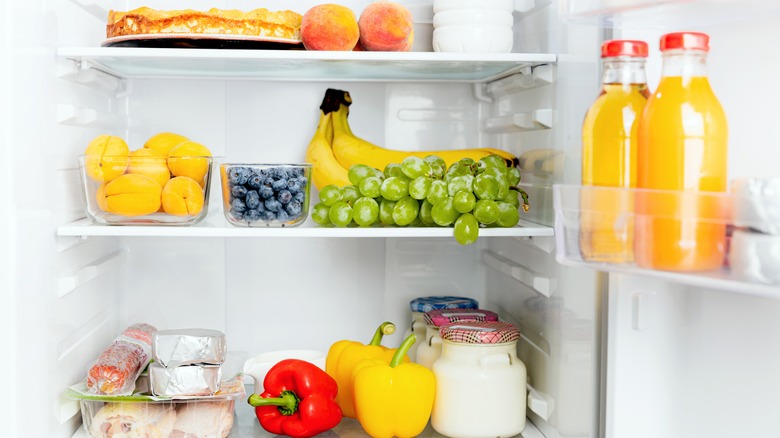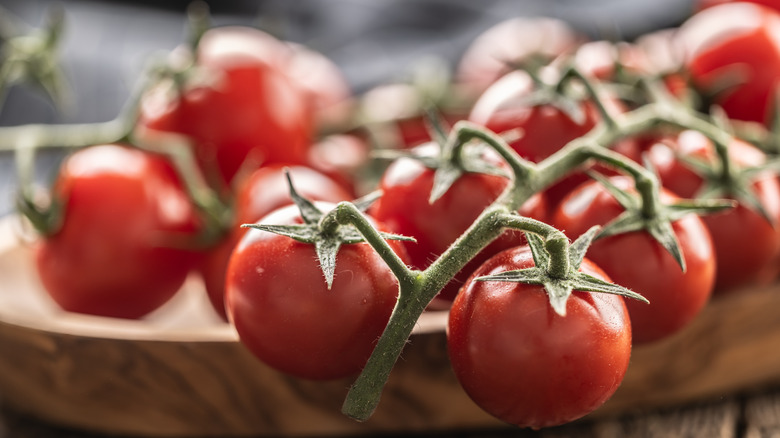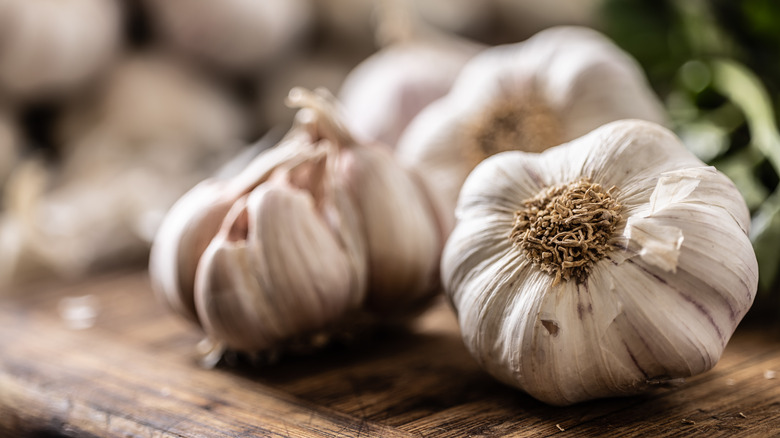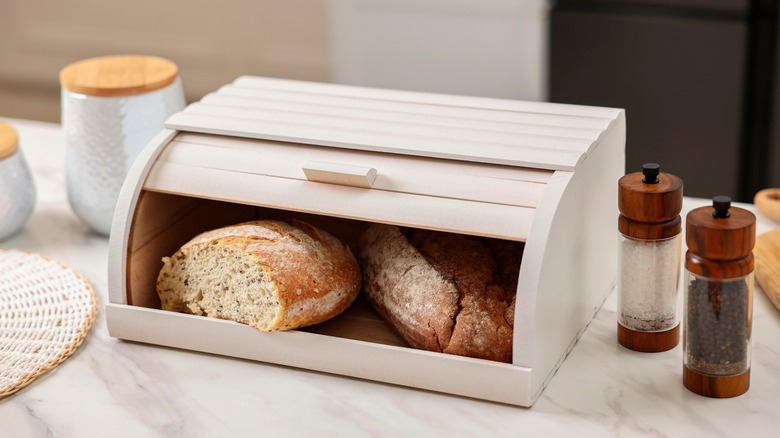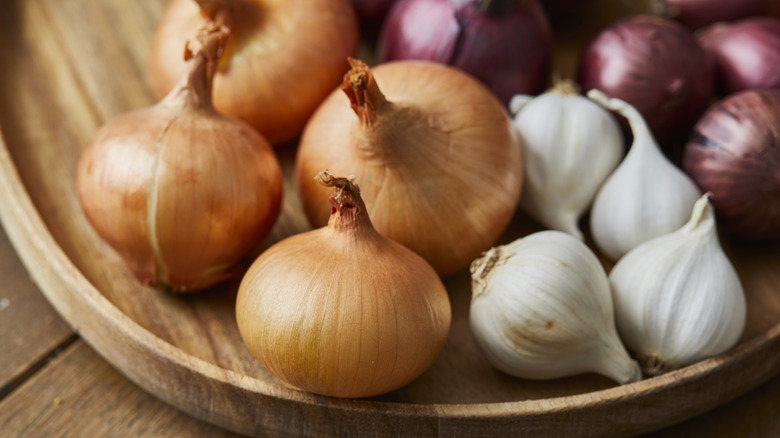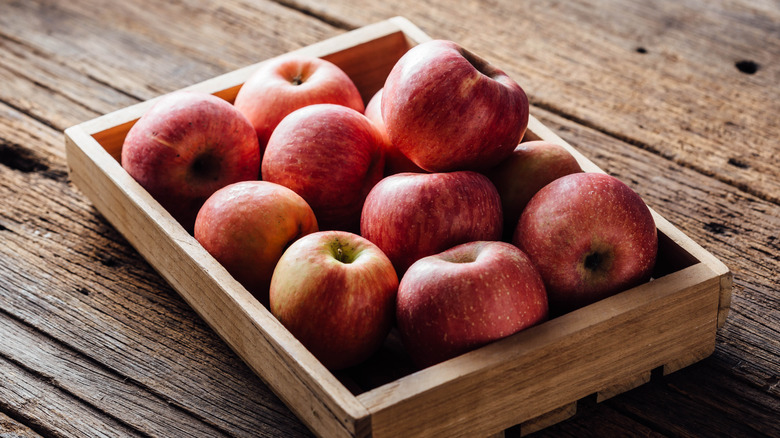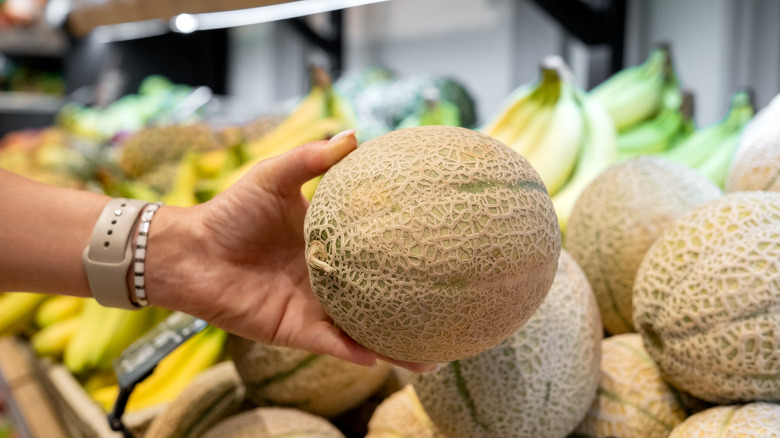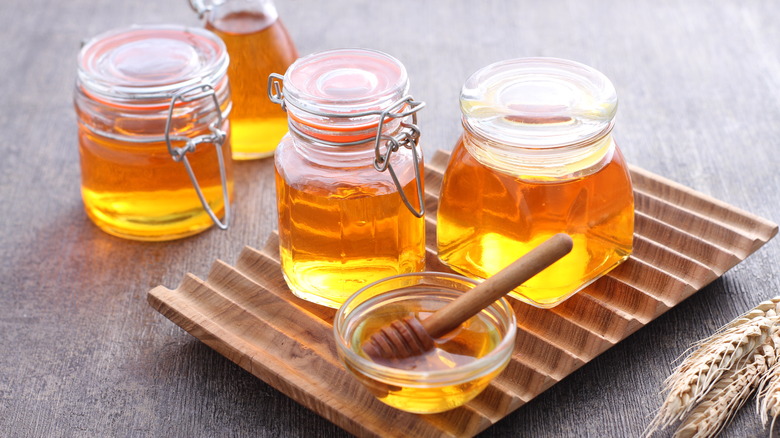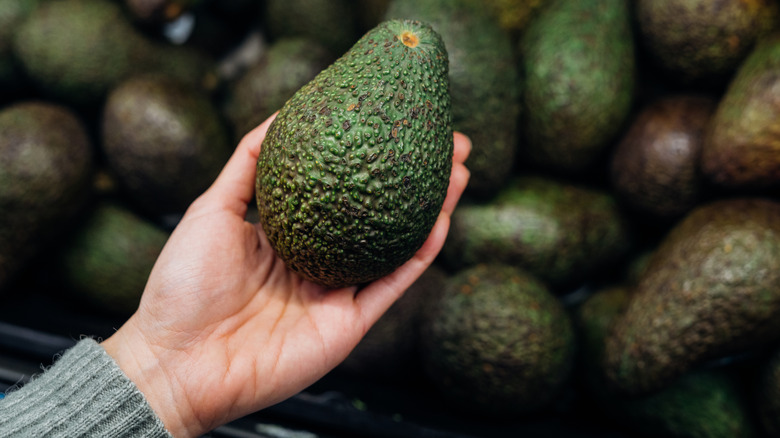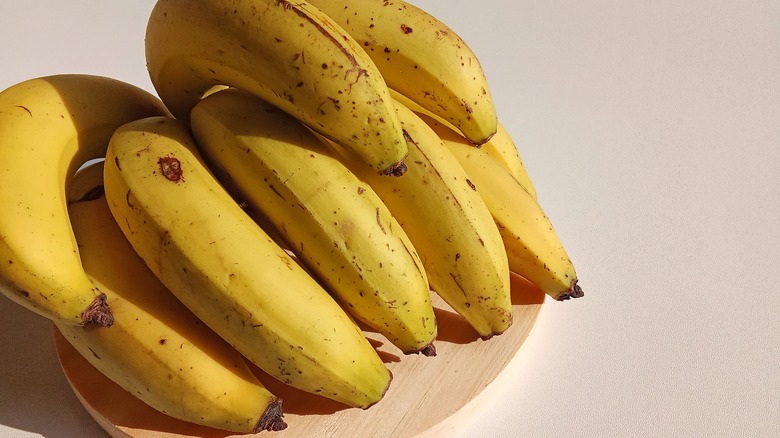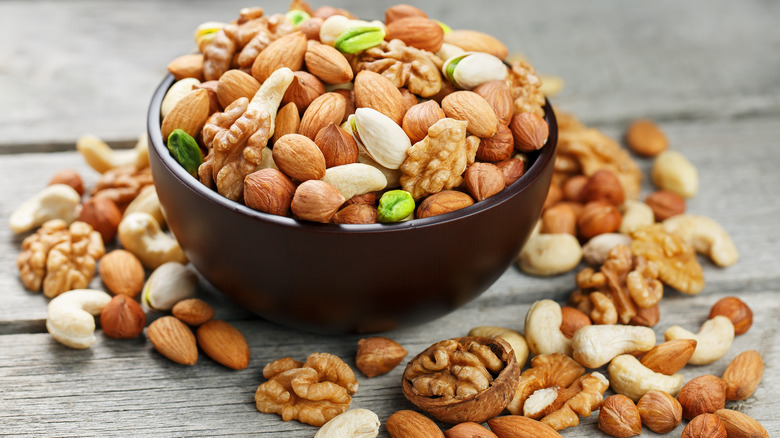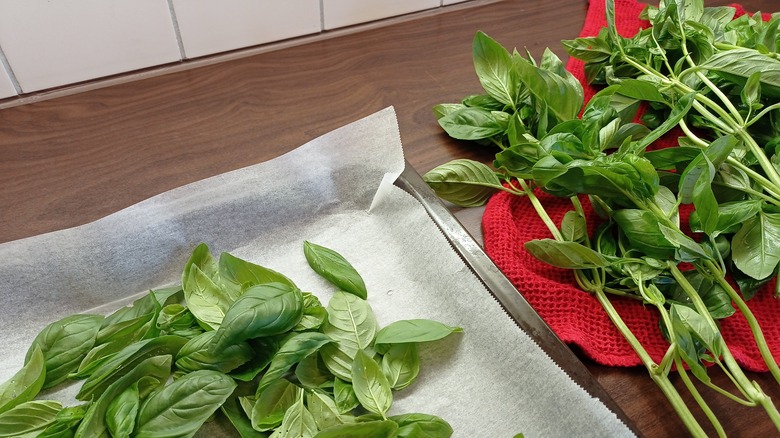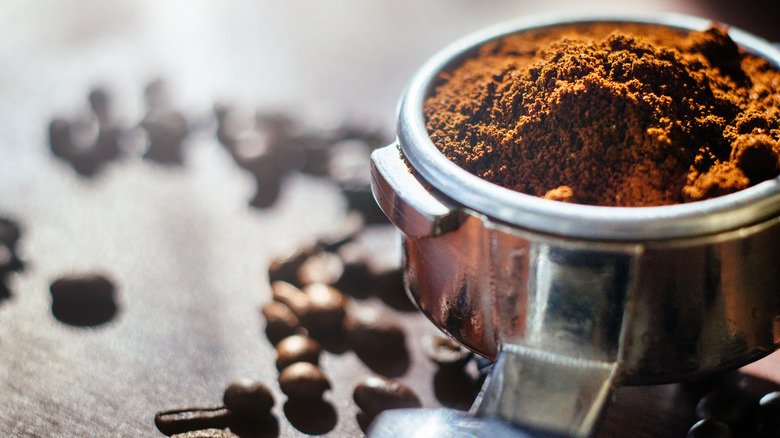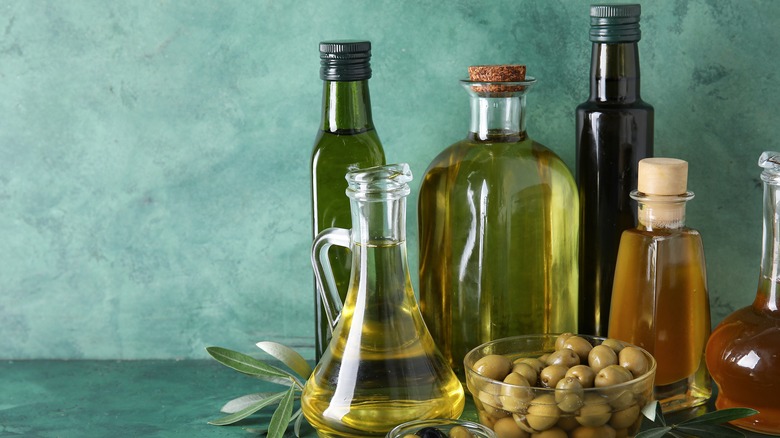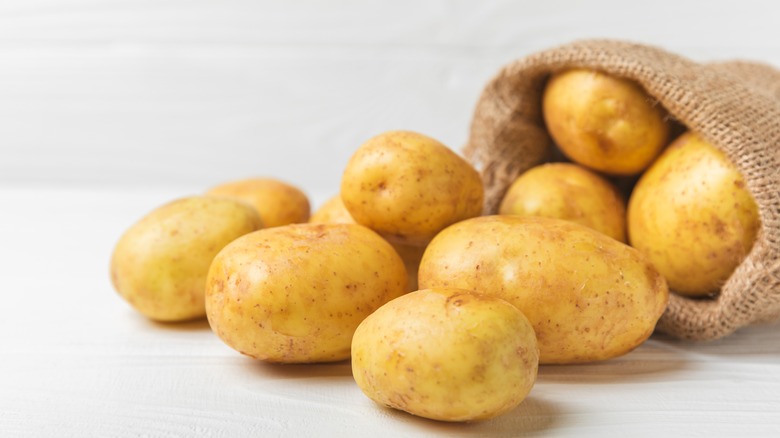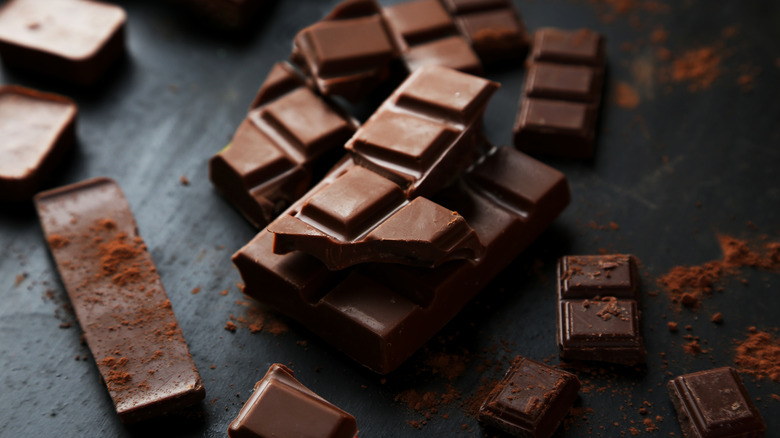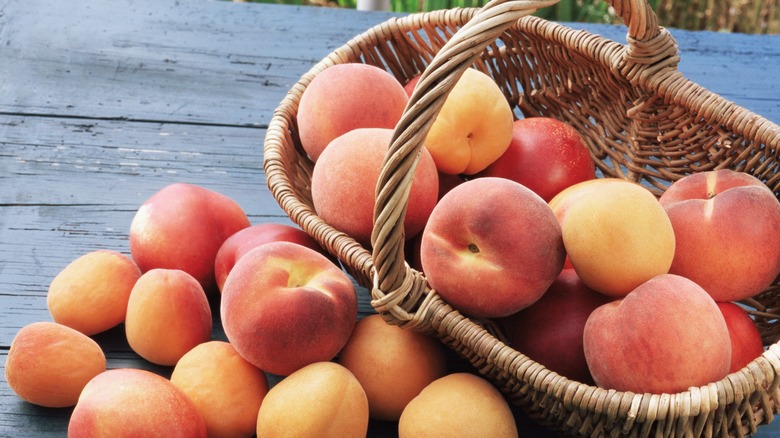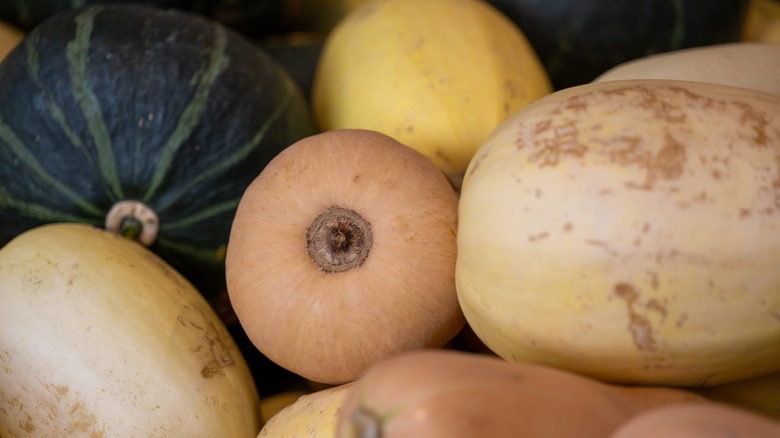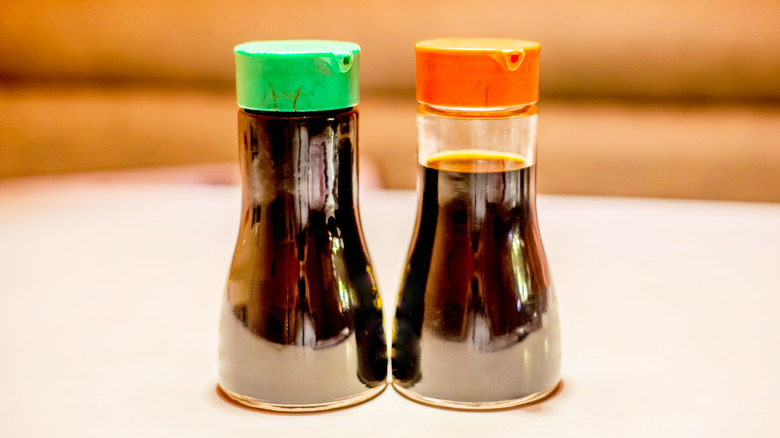Experts Warn Against Storing These Foods In The Refrigerator
What would we do without refrigerators? They help us prevent meats, dairy products, and other perishable items from spoiling. Without them, we wouldn't be able to enjoy the wide selection of fresh foods available to us. However, despite how great refrigerators are, some of us store foods in them that we shouldn't.
Three experts helped us learn why certain foods shouldn't be stored in the fridge. It can lead to negative changes to their texture, interfere with the ripening process, expose them to too much humidity, lead to mold growth, and more. Jessie-Sierra Ross, a TV food content creator on NBC, CBS, and PBS, a cookbook author of "Seasons Around the Table," and a food & lifestyle blogger at Straight to the Hips, Baby, Ken Tobby, a food expert and the CEO at Organic Solace, and Scott Groth a professional chef, a food blogger with I'd Rather Be a Chef, and a former catering business owner.
Tomatoes
While many people think the refrigerator is the best place to store tomatoes, Ken Tobby explains why doing so isn't the best idea. He says, "The low temperatures usually disrupt the tomatoes' cell membranes, resulting in a less palatable and mealy product." This means that the tomatoes will lose their natural flavor, whether sweet, tart, tangy, or earthy, depending on the variety, and their texture will not be right.
Instead, store your tomatoes at room temperature to allow them to ripen properly. This way, whether you're grabbing Roma, grape, or cherry tomatoes to make a salad, homemade pasta sauce, or anything else, you'll be confident that they'll impart the perfect texture and flavor to your recipe.
Garlic
When looking for the best way to store garlic, steer clear of the refrigerator. According to Scott Groth, garlic stored in the fridge "turns rubbery and can sprout in there." You won't be able to slice or press rubbery garlic as easily as that which is firm. And, while sprouted garlic may technically be safe to eat, the flavor won't be right. It can pack more of a punch, and if you eat any of the sprouts themselves, they often taste quite bitter.
Fortunately, storing garlic in a way that will keep it fresh and less likely to sprout isn't complicated. Groth explains, "It should be kept in a dry, well-ventilated area at room temperature." He highlights storage containers where air can circulate and/or pantries as ideal locations.
Bread
Perhaps you've heard that bread will stay fresh longer if stored in the refrigerator. However, you may regret your decision to stash that loaf in the fridge once you bite into the sandwich you make with it. Ken Tobby explains that refrigerated bread becomes stale much more quickly because of starch retrogradation, which is the process by which starch molecules lose their gelatinous quality after bread has been baked. Tobby says, "The bread gets dry and hard at lower temperatures because amylopectin in the structure of the bread recrystallizes faster. "
So, if you want to keep your bread from going stale too quickly, keep it at room temperature instead. Tobby suggests using "a breathable container, like a bread box, to allow for air circulation while minimizing moisture loss, in order to maintain its texture and moisture content."
Onions
Jessie-Sierra Ross explains one key reason to avoid storing onions inside a fridge: humidity. Refrigerator humidity has a negative effect on whole uncut onions. Ross says, "Onions and moisture don't mix! Place your next bag of onions in a cool and dry place to store; otherwise, they can become soft and moldy."
Scott Groth highlights one exception to this rule. "If you've cut an onion, that's when refrigeration is okay — just make sure it's sealed in an airtight container," he explains. Cut onions can last for about a week in the fridge with proper storage.
Apples
While apples can technically be stored in the refrigerator — and may even last a bit longer if they are — Jessie Sierra Ross doesn't recommend it. "Apples tend to absorb the scents that float around a packed refrigerator, and it can change that sweet-tart apple flavor we all love."
Unless you want to be disappointed when you bite into the big red (or green or yellow) apple, Ross says, "Store your apples at room temperature on your kitchen counters for the best taste and texture." She recommends using a basket and making it a functional part of your home's decor.
Uncut melons
When you pick up a cantaloupe, honeydew, or watermelon at the store, do you stick it in the fridge before you get around to cutting it? If so, you've been making a mistake. You should generally never refrigerate watermelon, cantaloupe, and other uncut melons. Doing so will have a negative impact on their flavor and aroma. Moreover, according to Ken Tobby, "refrigerating melons lowers their antioxidant content."
Before cutting a melon, leave it on the counter. Once you slice into the melon, however, it is a different story. Tobby explains, "They should be refrigerated after cutting to maintain their freshness and avoid spoilage."
Honey
"Storing honey in the fridge causes it to crystallize, making it difficult to use," explains Scott Groth. If you've ever left a jar of honey in the fridge — or even in the car on a cold day — you know how it can be practically impossible to squeeze into a cup of tea or onto a spoon to measure for a recipe. Storage for this gift from our beloved pollinators is not difficult, fortunately. Groth explains, "Honey is naturally shelf-stable due to its low moisture content, so a cupboard is the best place to keep it."
If you've already refrigerated your honey, don't worry. All is not lost. It is still safe to eat, but you can also soften it by placing the bottle in hot, but not boiling, water for about 15 or 20 minutes.
Unripened avocados
You spent time carefully picking the best avocados at the grocery store, but now you're home and are wondering where to store them. Well, take Ken Tobby's advice and keep them out of the refrigerator. He explains, "Avocados cannot ripen naturally in cold climates because refrigeration hinders the action of ethylene, a natural hormone that ripens fruit." Not only will they not ripen properly, their texture will also be off.
Instead, leave unripened avocados on the counter until they are perfectly ripe. Then, Tobby says, "They can be chilled once ripe to prevent additional softening and preserve their creamy quality."
Bananas
Have you ever tried to store bananas in the fridge? If you answered yes, you might have noticed that they turn brown. According to Scott Groth, "Refrigerating unripe or ripening bananas slows down the process and can cause the peel to turn really dark."
This delicious fruit is best left on the counter to ripen. That way, you can avoid that unattractive and unappetizing brown color. Groth recommends you "store bananas with some plastic wrap over the crown" when you leave them on the counter. He says this method will help keep them fresh for longer.
Nuts
The best storage method for nuts can vary depending on how quickly you plan to consume them. However, Ken Tobby does not recommend the fridge because "refrigeration for extended periods might make them lose their crispness and absorb moisture, changing their flavor and texture."
If you are going to eat nuts relatively quickly, Tobby explains that an airtight container in a dark, cool place is ideal, because "healthy fats found in nuts can become rancid over time, particularly when exposed to light and heat." However, if you're not going to consume your nuts for a few months, Tobby recommends using the freezer because it "helps prevent rancidity without interfering with its texture."
Fresh basil
When you snip some fresh basil from your garden or pick up a container from your local grocery store, you might assume that the refrigerator is the best place to keep it fresh. However, according to Jessie-Sierra Ross, "the cool temperatures of the chiller can damage and discolor the basil leaves."
She recommends leaving this delicate herb out on the counter. However, to keep it fresh, Ross says to submerge "the stems in a small glass or jar of water (just like a bouquet of flowers!) and out of direct sunlight on your kitchen counter."
Coffee
"Many people love storing their coffee in the refrigerator, thinking it prolongs the shelf life and flavor," shares Scott Groth. However, he notes that this storage method is less than ideal for coffee. "Coffee (both the beans and ground coffee) absorbs moisture from the refrigerator, which can affect the taste," Groth explains. Moreover, the higher moisture level of a refrigerator can even cause mold to grow on your coffee beans or grounds.
While you don't want to leave coffee out in the full sunlight, a cool and dark location, such as a pantry, is much preferred over a refrigerator. Follow Groth's advice and keep your coffee in an airtight container to help it stay fresh.
Olive oil
If you store olive oil in the refrigerator, you'll face disappointment and frustration when you're ready to sauté your veggies or mix up a vinaigrette dressing. As Jessie-Sierra Ross says, "If stored in temperatures below 40 degrees Fahrenheit, olive oil will solidify into a block." No one wants that when they are ready to add oil to a dish they're preparing.
Instead, Ross says, "Keep your olive oil ready to go for your next recipe by storing it in a cool and dry cupboard." Doing so will prevent oxidation while ensuring the oil is smooth, liquidy, and ready for whatever you need.
Potatoes
Have you heard that potatoes should be stored in the refrigerator? If so, you might want to reach out to whoever provided you with that bit of misinformation and make sure they're up-to-date on the best storage method for potatoes, sweet potatoes, and yams (and, no, yams and sweet potatoes aren't the same thing). Scott Groth explains why the fridge is a no-no for potato storage. "Cold temperatures convert the starches in potatoes into sugars, leading to an off taste and gritty texture," he says.
Groth also shares a few pointers for proper potato storage. He says, "They should be stored in a dark, cool place like a pantry or a paper bag to maintain their natural starch content."
Chocolate
Raise your hand if you think storing your chocolate in the refrigerator is best. Well, if you just raised your hand, listen to why Jessie-Sierra Ross says you'll want to change your preferred storage methods. "When chocolate is exposed to cold and then brought back to room temperature, it can develop something called a 'sugar bloom.' This is when the sugars of the chocolate rise to the surface, and it looks a bit like a white dusty film across the bar or morsels." This will not only make your chocolate look off, but it will also have a negative impact on its taste and texture. If you're a true chocolate lover, then you know there's nothing worse than messing with that delicious flavor.
To avoid messing with perfection, Ross says to keep chocolate somewhere cool and dark. A pantry, where it won't be affected by incoming sunlight, is one ideal storage location.
Unripened stone fruit
Whether you picked up some plums, peaches, or nectarines at the grocery store, your local farmer's market, or straight from the tree, Ken Tobby advises against placing these stone fruits in the fridge before they have finished ripening. He explains that they'll continue to ripen after they're picked but that the "process is slowed by refrigeration, which can result in the fruit becoming tough and flavorless. Their delicate texture is also compromised by the cold, becoming less juicy and mealy."
Leave stone fruit at room temperature. Avoid stacking the fruits together in a basket, as it can interfere with the airflow and prevent them from ripening properly. Once they've ripened, you can put them in the fridge until you're ready to enjoy them so they don't end up overripe.
Winter squash
Acorn squash, butternut squash, and other varieties of winter squash should not be kept in the refrigerator before they're cut. Jessie-Sierra Ross explains, "The colder temperatures of the refrigerator can cause damaging textural changes to the squash." Moreover, Ross notes that these fruits (yes, squash is technically a fruit) will also end up taking up a lot of your fridge space.
Before cutting or cooking winter squash, leave them on the counter or in the pantry (preferably somewhere cool and dry). However, Ross explains that you'll need to refrigerate winter squash after peeling or cooking it.
Soy sauce
According to Ken Tobby, there are a few reasons to keep soy sauce out of the refrigerator. First, he notes that refrigerating it can cause the liquid to become thicker than it should be and may negatively impact its flavor. Moreover, Tobby explains that because of soy sauce's higher salt content and classification as a "fermented foodstuff [...], it is fairly stable at room temperature." So, he notes that "soy sauce does not get better or last longer when refrigerated."
Instead of occupying precious door space in the fridge, you can find a cool and dark spot to keep your soy sauce, such as in a closed cabinet or pantry.
